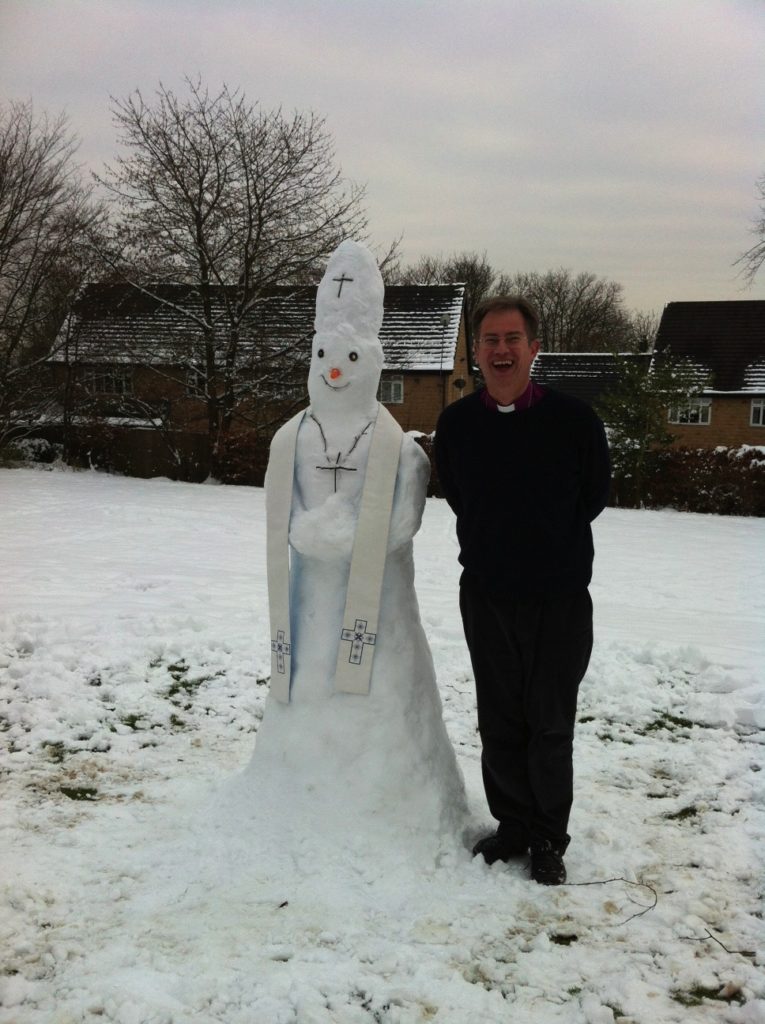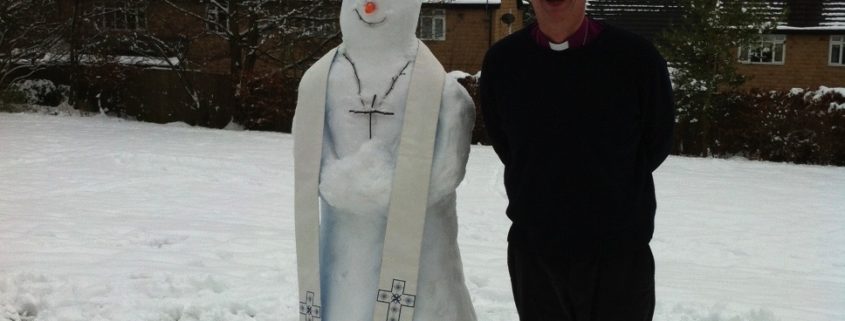We held a consultation on parish share for people across the Diocese this morning. Parish share is the financial contribution each parish makes to the Diocese to finance ministry costs and central expenses. We’re in the middle of a review here and the main work of the morning was for those who came to explore three different options. More details of these will be appearing on our diocesan website in the next few days: Diocese of Sheffield
We have heavy snow in Sheffield at the moment so my expectations were low. 175 people came which was brilliant for such a day representing around 70 parishes and every deanery. Well done to the whole team.
My task was to give a keynote address to introduce the more practical stuff and what I said is here.
The snow bishop is nothing to do with this morning. I’ve been away on a conference with our curates for part of this week and the snow bishop was their creation. Enjoy!  Grace and Generosity
Grace and Generosity
Thank you very much for being here this morning and for giving this time to help us discern together how best to move forward in Parish Share. Thank you for all that you give personally and thank you for all that your parishes are able to give particularly in the present challenging financial climate.
The Letter to the Ephesians calls the Church of Jesus Christ the household of God (1.19). Every household has to have conversations at key moments about housekeeping and the budget.
My task is to set this important conversation about our diocesan housekeeping in the broader concept of what the Scriptures teaches about money and giving. To set that context I just want to say two things.
What the Bible has to say about money and giving and church finances is focussed for me in two words. The first is grace. The second is responsibility. Grace and Responsibility.
We begin of course with grace. All of our conversation this morning needs to be set in the context of God’s gracious, generous love. We see God’s grace in creation: the universe itself is the overflow of God’s nature. God had no need to make the world and all that is in it. The beauty and variety of the natural world, the abundance of creation, all witnesses to God’s generosity and love.
We see God’s grace in the story of salvation: in God’s call of Abraham to leave his land and giving him an inheritance to make him a blessing to all nations. We see God’s grace in the call of Moses to bring the Israelites out of poverty and slavery to a land flowing with milk and honey. We see God’s grace in the giving of the law. Throughout there is a concern for the proper ordering of society, for mutual responsibility, for care of the weak and vulnerable. We see God’s grace in the ministry of the prophets who again and again remind God’s people of his great love and mercy and the need for the rich to share what they have and give to the poor.
We see God’s grace most of all of course in the gift of his Son Jesus Christ. “God so loved the world, says St. John, that he gave his only Son so that everyone who believes in him might not perish but may have eternal life” (3.16)
“For you know the generous act of our Lord Jesus Christ”, writes Paul. “That though he was rich yet for your sakes he became poor, so that by his poverty you might become rich” (2 Corinthians 8.9). Paul writes these words in the context of a long passage on Christian giving and mutual support.
The grace of God in salvation is shown not only in Christ’s incarnation but also in his death: in his offering of his life, all he has and all he is, on the cross for our sakes. The sacrifice of Christ is what achieves and wins so great a salvation for us. Because of his death we are restored to communion with God and to eternal life. But the sacrifice of Christ on the cross becomes also the pattern for the offering not only of our money but of our who lives in dedication, grace and love:
“I appeal to you therefore brothers and sisters by the mercies of God to present your bodies as a living sacrifice, holy and acceptable to God which is your spiritual sacrifice” (Romans 12.1).
Isaac Watts great hymn on the passion has as its final verse:
“Were the whole realm of nature mine, that were an offering far to small. Love so amazing, so divine, demands my soul, my life, my all.”
God’s grace continues to be shown in the offering of forgiveness and resurrection life to those who do not deserve it and have not earned it and that includes each one of us. It is demonstrated in the pouring out of the Holy Spirit, in gifts for ministry, in sustaining the Christian community from generation to generation.
Before ever we sit down to do our housekeeping this morning, before ever we begin to talk about parish share and its collection, we need to fill our minds full again of the grace and love of God and the wonder of our salvation. Before we are tempted to speak to one another of how poor we are, we need to remember how rich we are in Christ. Before we say to each other how little we have, we need to remind ourselves how much we have been given. Before we speak of how difficult it is to give, we need to remember how much we have received. Let this conversation and all the conversations which flow from it be filled with grace, grace, grace and more grace.
“Blessed be the God and Father of our Lord Jesus Christ who has blessed us in Christ with every spiritual blessing in the heavenly places” (Ephesians 1.1). Amen?
That is why our first response to God’s love and grace should never be complaint but disciplined and careful thanksgiving. Paul has to write some very difficult letters to correct the Church in the New Testament. Each one begins with thanksgiving and appreciation for the people he is writing to because they are the saints of God and because God’s love and mercy is shown in them:
“I have heard of your faith in the Lord Jesus and your love towards all the saints and for this reason I do not cease to give thanks for you as I remember you in my prayers” (Ephesians 1.15). We have much to give thanks for. When I was a parish priest, our parish finances were an annual miracle. I never knew where the money was going to come from in what was a very poor community. Every year it came and I gave thanks. Now I am a bishop, our diocesan finances are an annual miracle. We serve what is by and large one of the poorest areas of England. Our diocese is 40th out of 43 dioceses in the league table of the wealth of the region. Yet the people of this diocese give generously and many give sacrificially to sustain the ministry of God’s church and continue to give in that way even in the midst of an extremely challenging economic downturn. Thanks be to God for all that means.
So we need to give thanks. But the Bible also teaches us gently and firmly about the need to take responsibility for our giving, for our generosity to one another, for our responsibility to one another and especially about the responsibility of the rich to help the poor and the strong to help the weak.
That responsibility is underlined in the law and the prophets and in the teaching of Jesus Christ. It is Jesus who teaches us in the parable of the widows mite that it is the proportion of what we give which is measured by God and not the amount. The gospels teach us in the stories of Zaccheus and the rich young ruler just how much following Christ frees us from slavery to money.
We are to take a responsible attitude to our individual giving. We are to aim high. The Church of England benchmark for giving to and through the Church is 5% of our income. As a Diocese we average 4.4% at the moment. We need to aim higher. Let’s be the first diocese to reach that target. That will mean many of us hearing the call to give more than 5% for the sake of ministry and mission in our generation. I hope I don’t need to say this but the call to give financially applies to clergy households as well as to lay households. It is a call we all share. There needs to be in every parish, every year, some kind of focus and challenge on money and giving and the opportunity for people to review what they give.
We are to take a responsible attitude together to our giving for the support of stipendiary ministry. Stipendiary ministry is a precious resource. It is a vital resource. It is also a demanding resource to finance. We are doing all we can as a diocese to distribute our resource of stipendiary ministry wisely and fairly across the diocese and to use our stipendiary ministers in a different way which will lead and is beginning to lead to the growth of the church in this region. But to do that we need every parish to be responsible in its own gift of parish share: to make the payment of parish share a first priority on your budget, to meet commitments already made, to give regularly.
There are spiritual consequences to our giving because that giving is a measure of our priorities, of our own generosity, of the ordering of our lives. Churches can be generous or selfish just as individuals can. That selfishness needs to be addressed as the spiritual problem it is.
“Remember this”, writes Paul. “the one who sows sparingly will also reap sparingly and the one who sows bountifully will also reap bountifully. Each one of you must give as you have made up your mind, not reluctantly or under compulsion, for God loves a cheerful giver” (2 Corinthians 9.6).
And we need to be responsible in the household of God for the way in which we invest the money of God’s people. Last year we reviewed our future plans for parochial ministry and stipendiary ministry in order to ensure the diocese is sustainable and is able by the grace of God to grow in every place. We have a clear vision and strategy. This year we are reviewing our central support services and our spending there to ensure it serves the vision and that nothing is wasted. We need both to invest and to give responsibly. That is a challenge for the Church in this financial climate as it is a challenge for every other organization.
But as we exercise that responsibility this morning and in conversations across the Diocese this year, we need to be sure that our hearts and minds are filled, first and foremost, with the grace and love and generosity of the God who calls us together. Only by focusing on God’s grace and love will we see our hearts and lives converted more deeply, our parishes converted more deeply and our region converted more deeply to follow Jesus Christ our Lord and Saviour, who gave everything for us. Amen.

